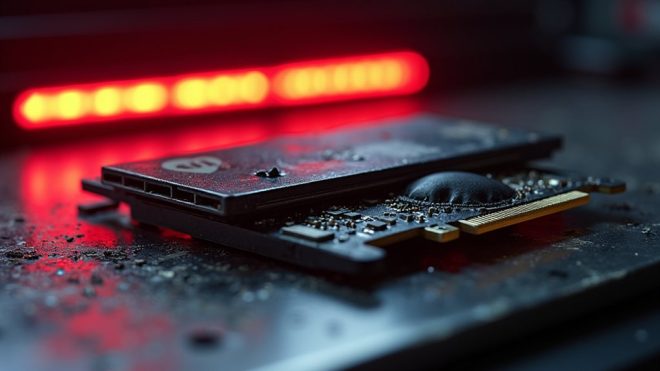Microsoft’s Windows 11 update KB5063878 is triggering widespread SSD failures and data loss, with Samsung 990 Pro drives particularly vulnerable. The update causes drives to become undetectable or corrupted, especially during large file transfers exceeding 50GB. As Microsoft found no direct correlation, affected users report drives appearing as RAW file systems with inaccessible data. Systems using hibernation features face increased risk, and rolling back the update won’t restore damaged drives. The full scope of this digital disaster continues to unfold.

A widespread Windows 11 update is wreaking havoc on solid-state drives, with users reporting catastrophic SSD failures and data loss after installing the KB5063878 patch. The issue, initially concentrated in Japan but now reported globally, has left users scrambling to salvage their data as drives mysteriously vanish from their systems or become completely undetectable.
The problem typically manifests during or after large file transfers exceeding 50GB, with users discovering their SSDs transformed into expensive paperweights. What’s particularly concerning is the scope of affected hardware – from consumer-grade drives to professional-grade 8TB Seagate Barracuda units, suggesting this isn’t your typical compatibility hiccup. Technical analysis reveals that Samsung 990 Pro SSDs are among the most frequently impacted devices. The company’s thorough investigation over a week found no direct correlation between the update and reported failures.
Microsoft’s investigation has yielded a surprising twist: they’ve found no direct link between the update and the failures. Meanwhile, Phison, a major controller manufacturer initially caught in the crossfire of rumours, has gone on the defensive, threatening legal action against those spreading unverified controller lists. Their extensive 4,500-hour testing campaign failed to reproduce the issues.
Despite extensive testing and investigations, neither Microsoft nor Phison can pinpoint the root cause of these devastating SSD failures.
The technical symptoms read like a horror story for IT professionals. Drives show up as RAW file systems, CHKDSK utilities throw in the towel, and Windows Explorer teases users with visible folder names while refusing to open actual files. Even Linux systems can’t mount these corrupted drives, suggesting the damage runs deeper than Windows-specific issues.
Environmental factors appear to play a significant role in these failures. Systems utilising hibernation and fast startup features seem particularly vulnerable, especially when large hiberfil.sys files reside on secondary SSDs. Drive fill levels above 60% and sustained write operations appear to increase the risk of failure, leading manufacturers to recommend additional cooling measures.
The impact has been devastating for some users, with one documented case involving 8TB of professional data, including critical SQL databases and development projects, hanging in the balance. Adding insult to injury, rolling back the update doesn’t resurrect corrupted drives, leaving users in digital limbo.
Microsoft’s current stance? Uninstall KB5063878 as a temporary solution while they continue their investigation. It’s a band-aid approach that might prevent future failures but offers little consolation to those already affected. Meanwhile, Phison’s suggestion to install heatsinks feels like bringing a fire extinguisher to a flood – perhaps helpful, but not addressing the core issue.
As the tech community grapples with this digital disaster, one thing becomes clear: the intersection of software updates and storage technology remains a delicate balance. Until a definitive solution emerges, users might want to think twice before clicking that update button – especially if their life’s work resides on those vulnerable SSDs.
Final Thoughts
The recent KB5063878 update for Windows 11 has raised significant concerns among users, as it has led to reports of SSD failures that compromise data integrity. As Microsoft investigates the situation, users are encouraged to hold off on installing this update until a reliable fix is made available. This underscores the potential risks associated with routine system updates.
If you’re feeling overwhelmed by these issues, The Emotional Computer team is here to help you navigate these challenges. We can assist you in ensuring the safety of your data and optimizing your system. Don’t hesitate to reach out – click on our “Contact Us” page to get in touch with us today!

